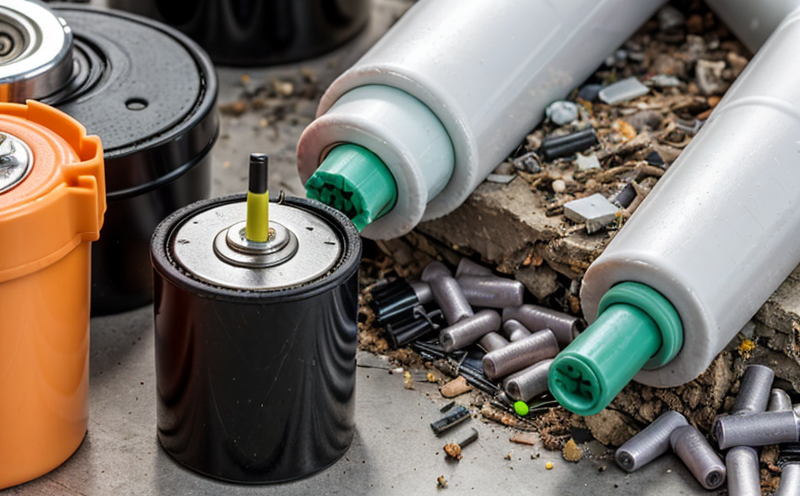SAE J2289 End-of-Life Testing of EV Battery Modules
The SAE J2289 standard provides a framework for evaluating the end-of-life (EOL) performance and condition of electric vehicle (EV) battery modules. This service is critical in ensuring that recycled materials from these batteries are reused efficiently, thus promoting sustainability and reducing environmental impact.
As quality managers and compliance officers, you will appreciate how SAE J2289 helps standardize the testing process to ensure consistency and reliability across different manufacturers and recycling facilities. For R&D engineers, this service offers a valuable tool for optimizing battery performance and lifecycle management. Procurement teams can rely on this service to verify that recycled materials meet quality standards before they are incorporated into new products.
The SAE J2289 testing protocol assesses various parameters of the EV battery modules including capacity retention, internal resistance, state-of-charge (SOC), and other relevant metrics. This ensures that batteries are accurately assessed for their remaining useful life, aiding in informed decisions regarding recycling or repurposing.
Our laboratory is equipped with advanced instrumentation to perform these tests, ensuring precise and reproducible results. The testing process involves thorough preparation of the battery modules, including conditioning to a known state-of-charge and discharging until a predetermined cut-off voltage. This meticulous approach guarantees accurate assessment of the battery's health at end-of-life.
The SAE J2289 standard emphasizes the importance of accurate data collection and reporting. Our laboratory adheres strictly to this requirement, providing detailed reports that include all relevant test results along with recommendations for further actions based on these findings. This ensures transparency and trust in our testing services.
Our expertise in this area is rooted in years of experience and a deep understanding of the nuances involved in EOL battery testing. We stay current with updates to standards like SAE J2289, ensuring that we provide cutting-edge solutions to meet your specific needs. By partnering with us, you can rest assured that your EV batteries are being tested according to the highest industry standards.
Scope and Methodology
| Test Parameter | Description |
|---|---|
| Capacity Retention | Determines how much charge a battery can hold compared to its initial capacity. |
| Internal Resistance | Measures the electrical resistance within the battery, indicative of internal health. |
| State-of-Charge (SOC) | Assesses the battery's current charge level, useful for lifecycle management. |
| Cycling Capability | Evaluates the number of times a battery can be cycled before reaching its end-of-life. |
| Electrochemical Analysis | In-depth analysis of the battery's electrochemical properties to assess remaining life expectancy. |
| Thermal Stability | Tests for thermal stability and potential risks in recycling or repurposing. |
| Dissolution Studies | Evaluates the release of potentially harmful materials during recycling processes. |
The methodology involves several steps, beginning with the receipt of the battery module. Once received, it is conditioned to a known state-of-charge and discharged until specific cut-off voltages are reached. This ensures that all batteries tested start from an identical condition, which is crucial for accurate comparison.
Following conditioning, various tests are conducted according to SAE J2289 protocols. These include measuring capacity retention, internal resistance, state-of-charge, cycling capability, electrochemical analysis, thermal stability studies, and dissolution studies. Each test provides critical insights into the battery's health and remaining useful life.
The data collected from these tests is then analyzed using advanced software tools. The results are compiled into comprehensive reports that include recommendations for further actions based on the findings. These recommendations could range from immediate recycling to repurposing or extended use in less demanding applications.
International Acceptance and Recognition
The SAE J2289 standard has gained widespread acceptance and recognition within the industry. It is widely adopted by manufacturers, recyclers, and regulatory bodies worldwide due to its comprehensive approach to evaluating EV battery modules at end-of-life.
Manufacturers appreciate the consistency it brings to the testing process, ensuring that batteries are accurately evaluated regardless of their origin. Recyclers benefit from this standard as they can confidently use recycled materials in new products, knowing that they meet stringent quality standards. Regulatory bodies also find value in SAE J2289, as it helps ensure compliance with environmental regulations and promotes sustainable practices.
The acceptance of the SAE J2289 standard is reflected in its adoption by numerous international organizations including ISO, ASTM, EN, and IEC. This global recognition underscores its importance in the field of EV battery recycling and end-of-life testing.
Our laboratory's commitment to adhering strictly to this standard ensures that our clients receive reliable and internationally recognized results. By partnering with us, you can ensure that your recycled materials meet the highest industry standards, fostering trust and confidence in your sustainability initiatives.
Use Cases and Application Examples
The SAE J2289 standard finds application in various sectors where EV batteries are being recycled or repurposed. Here are some specific use cases:
Recycling Facilities: Recycling facilities use the results from SAE J2289 testing to determine whether a battery module can be reconditioned, refurbished, or must go directly into recycling streams.
Manufacturers of New Products: Manufacturers incorporate recycled materials derived from EOL batteries into new products. Accurate testing ensures that these materials are safe and perform as expected in the end product.
R&D Departments: R&D teams use SAE J2289 results to optimize battery designs for improved performance, longevity, and efficiency. This helps in developing more sustainable and efficient electric vehicles.
Regulatory Bodies: Regulatory bodies rely on the consistent data from SAE J2289 tests to enforce environmental regulations and promote sustainability practices within the industry.
The application of SAE J2289 ensures that recycled materials are put to their best use, contributing significantly to sustainable manufacturing processes. By leveraging this standard, organizations can enhance their reputation for environmental responsibility while also driving innovation in product development.





